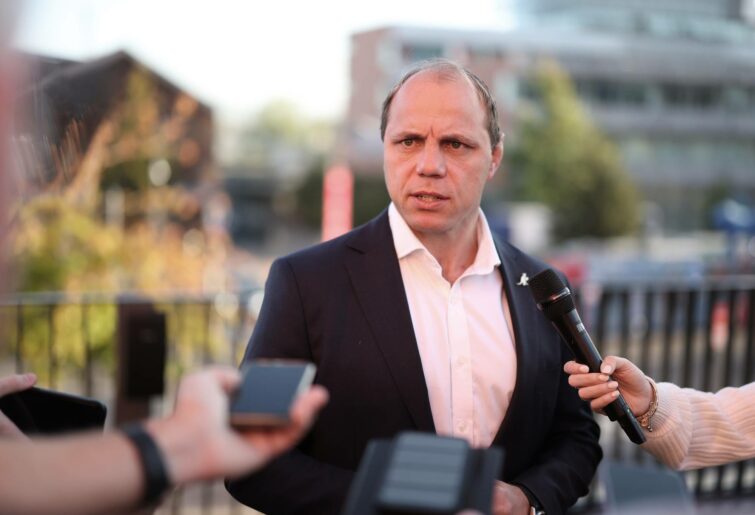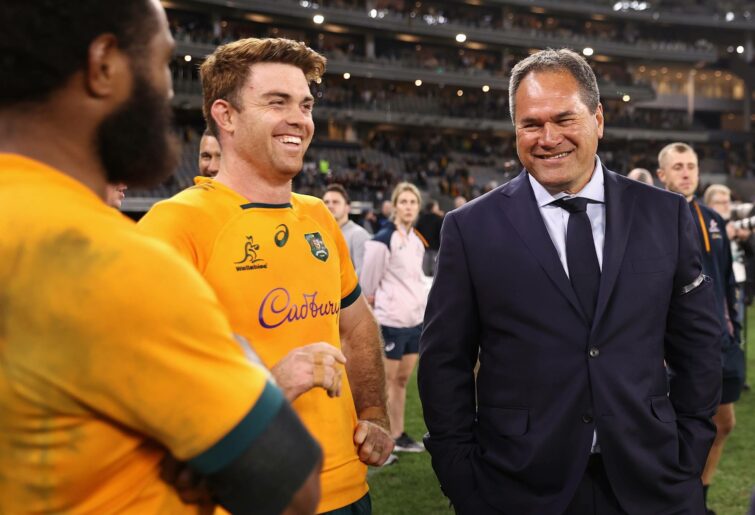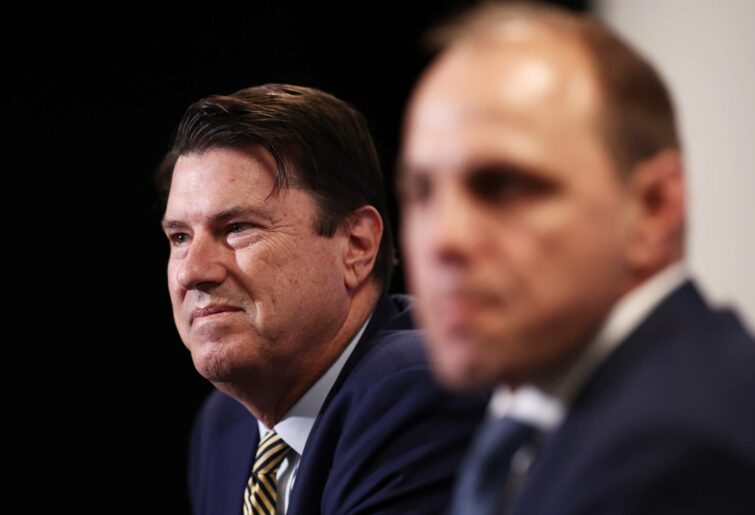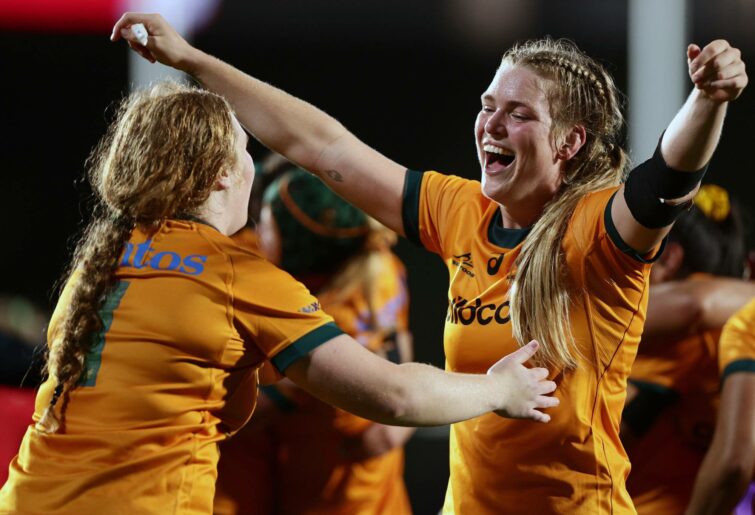In the wake of Australia’s shambolic pool stage exit at the World Cup, Rugby Australia announced last Thursday, the appointment of a three-person panel to conduct a review of the Wallabies’ season.
According to an official statement, “The panel will review the strategy and structure of the Wallabies’ performance environment in 2023 and aims to deliver its recommendations to the Rugby Australia board before the end of the year.”
It’s reasonable to expect any public or private company missing its performance targets by a wide margin and experiencing the resignation of key personnel and the dismissal of others to get to the bottom of why. An external review is often an appropriate process to uncover hard truths, and to provide a platform for recovery.
But as anybody who follows the sport in Australia knows, Rugby Australia is no normal business. Its governance structure comprises historic, parochial, state-based voices, uneasily blended with hand-picked board members who, in some cases, tick diversity and ‘other than rugby experience’ boxes, or who happen to be connected to the ‘right’ people.
With chairman Hamish McLennan’s determination to play an active, front-facing role, traditional lines of responsibility between the board and the executive management and operations have not just been blurred, but obliterated.
With his autonomy neutered, the resignation of CEO Andy Marinos, in May this year, came as no surprise. Nor did the appointment of a successor with no prior experience in such a position, in the expectation that he might be more pliable and more forgiving of the chairman’s intrusions.
To his credit, new CEO Phil Waugh appears to be growing into the role, and despite being a member of the board that waved through the exorbitant contracting of Joseph Sua’alii, the sacking of Dave Rennie and the appointment of Eddie Jones as Wallabies coach, he seems to be largely untarnished by the current situation.

Rugby Australia CEO Phil Waugh speaks to the media on October 02, 2023 in Saint-Etienne, France. (Photo by Chris Hyde/Getty Images)
It was Waugh who featured prominently in the announcement of the review, which, among other things, looms as a test to establish whether he has the internal and external authority to lead necessary change for rugby in Australia, or not.
Of interest are the panellists appointed. Of more interest is the scope of review.
The review will be conducted by ex-Wallaby grand slam-winning captain, Andrew Slack, vastly experienced high-performance and coaching administrator, Darlene Harrison, and RUPA CEO and Stan Sport commentator, Justin Harrison (no relation).
In terms of expertise, there is no reason why this panel won’t pull together a meaningful and insightful report, albeit there are concerns that Justin Harrison – an intelligent and wholly committed contributor to Australian rugby – is conflicted with respect to his player representative role.
Should the need arise, how hard might Harrison be prepared to go at the business that effectively funds the organisation he heads? What happens if the actions of players, individually or via their contractual framework, is determined to be a contributing factor?
Because humour is in short supply these days when it comes to Australian rugby, we should at least all put a dollar on the phrase ‘inside shoulder’ appearing multiple times in the body of the report.
The scope of the report is where things get interesting – because of what the panel hasn’t been asked to consider, and whether the review might thus be potentially rendered moot.
Specifically, Rugby Australia has asked the panel to review “the strategy and structure of the Wallabies’ performance environment in 2023.”
Let’s hypothetically surmise that the panel finds that coach Eddie Jones was unable to compile a world-class coaching unit, given the ‘mid-cycle’ timing of his appointment. Or that he had insufficient time in which to determine his best team prior to the World Cup.
Or that the panel might determine that Jones made a conscious decision to jettison a number of vastly experienced players in order to get a head start on preparation for the 2027 World Cup. Or that there remains tension and lack of clarity in decision making between the coaching, strength and conditioning, and medical staff which continues to contribute to an excessive number of soft-tissue injuries.
Is it the panel’s role to determine those and other factors, and link them to Australia’s failure and, along with some recommendations, leave it at that?
Or is it the role of this panel to scratch deeper and ask why Jones’ appointment was made when, whatever one’s views on Dave Rennie, it must have been known that continuity and team cohesion would be profoundly impacted?

Andrew Kellaway of the Wallabies and Wallabies Coach Dave Rennie smile after winning game one of the international test match series between the Australian Wallabies and England at Optus Stadium on July 02, 2022 in Perth, Australia. (Photo by Cameron Spencer/Getty Images)
Essentially; is this a review of the performance of the head coach and others in the high-performance team, or is this a review of how the head coach and the high-performance team got to be appointed in the first place?
If it is the former, the question might reasonably be asked, ‘what is the point?’ That caravan has already moved on, and nobody’s job is at stake.
If it is the latter, then that’s clearly a more pertinent exercise in getting to the root cause of the problems that led to the disastrous outcomes. Not whether Jones is a competent coach or selector or not, but whether the nature and timing of his appointment was always doomed to fail, and/or whether Australia’s systemic, structural impediments were always going to lead to this kind of crash, no matter who the coach was.
That feels like far too big a piece for a three-person panel to digest, form conclusions and recommendations on, and report back on, in just seven weeks.
It would also go against every action so far by McLennan, to potentially expose himself to criticism for his decision to sack Rennie and hire Jones, and to effectively scuttle Australia’s World Cup hopes.
McLennan was once again prominent in the media over the weekend, using The Weekend Australian to liken himself to Theodore Roosevelt and to try to portray himself, the board and Waugh as a decision-making triumvirate. Interestingly, that seemed to apply only to the questionable decisions, whereas claimed successes around sponsorship and confirmation of hosting of the 2027 and 2029 World Cups were reserved for himself.

(Photo by Matt King/Getty Images for Rugby Australia)
There is also the matter of a similar end-of-season review carried out last year, the findings of which were never made public.
One imagines that if the review was critical of Rennie, it would have seen the light of day, in support of McLennan’s decision.
If that wasn’t the case, and the chairman acted unilaterally to remove Rennie regardless – and effectively CEO Marinos as a result – then it might reasonably be asked, what is the purpose of such a review, other than to breed cynicism in the fan base?
And what of players asked to contribute their thoughts? It is fanciful to suggest that, this time last year, any player was agitating for a change of coach and a pathway into a miserable World Cup experience.
Twelve months later, it would be no surprise if players approached to contribute to this review wonder, ‘what is the point of asking us, you never listen anyway’?
With the pain of the World Cup beginning to dull, it is vitally important that Australian rugby gets its bloodletting over with, and begins to focus forwards. Wherever one stands on Jones, because the circus surrounding him had grown larger than life, his resignation was welcome and necessary for this to occur.
There are many good things occurring at grassroots and franchise level that need trumpeting and building off.
But it is also key that for forward progress to be made, there be genuine acknowledgement and contrition from Rugby Australia’s leadership, that what has happened – this year and over the last two decades – is wrong, and that it must be fixed, and that the right people and processes are in place to do so.
Threats thinly disguised as headlines from McLennan – “Spear me and there will be a world of pain” – are not the way to go about this.
It is up to Australian rugby’s leadership to make the cynicism and discontent go away. If this review turns out to be another report buried, or a whitewashing exercise due to deliberately narrow terms of reference, then nothing will have been gained.
In positive news for Australian rugby, the Wallaroos capped off a great fortnight’s work by overcoming Wales, in Auckland, 25-19.

Kaitlan Leaney of Australia celebrates victory in the WXV1 match between Australia Wallaroos and Wales at Go Media Stadium Mt Smart on November 03, 2023 in Auckland, New Zealand. (Photo by Dave Rowland/Getty Images)
While this result was in line with the 13-7 win over the same opposition in last year’s World Cup, it was the surprise 29-20 win over France, the week before, that really caught the attention.
At the World Cup, France was one missed kick away from beating eventual champions New Zealand in their semi-final. They have been a high-class team, with far more resources at their disposal than Australia, over the last four-year cycle.
Properly funding high-performance women’s rugby is one of many crucially important challenges for CEO Waugh. Australia’s leading female players are clearly doing their bit on the field. They deserve far more than throwaway media grabs from McLennan about Eddie Jones overseeing the Wallaroos program when there was never the capacity nor intent for him to do so.
The next few weeks will be pivotal. The extent to which the Wallabies season review is an honest attempt to provide solutions, and the Rugby Australia board demands accountability from its chair, will determine how genuine the sport is in forging a solution that the entire rugby community can embrace and support.
































































































